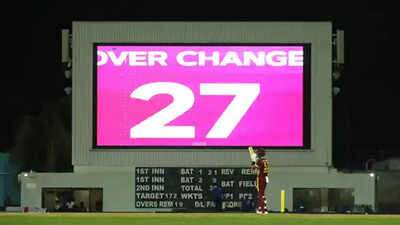Introduction
In a bid to address the perennial issue of slow over rates in cricket, the International Cricket Council (ICC) has announced a significant measure set to become a permanent feature in men’s One Day Internationals (ODIs) and T20 Internationals (T20Is) between Full Members. This groundbreaking initiative, known as the stop clock rule, is poised to revolutionize the pace of play in limited-overs cricket, ensuring a more dynamic and engaging spectacle for fans worldwide.
The Stop Clock Rule: A Game-Changer for Cricket
The stop clock rule, which has undergone trials in international cricket since December last year, mandates that the fielding side must be prepared to commence an over within a minute of the previous one concluding. Failure to adhere to this stipulation will incur penalties progressively, aiming to incentivize promptness and efficiency on the field.
Implementation of Penalties
Under the new regulations, the fielding team will receive two warnings from the umpires for breaching the one-minute limit between overs. Subsequently, a five-run penalty will be imposed for every subsequent offense, thereby compelling teams to expedite their overrates.
Impact of the Stop Clock Trial
The decision to institutionalize the stop clock rule stems from its demonstrable efficacy during the trial period. Reports presented to the ICC’s Chief Executives’ Committee (CEC) revealed a remarkable time-saving of approximately 20 minutes per ODI match. Notably, no team surpassed the prescribed one-minute threshold between overs three times in an inning during the trial phase, thus averting the imposition of the five-run penalty.
Additional Measures to Address Overrates
In conjunction with the stop clock rule, the ICC has introduced supplementary penalties to curtail overrates in limited-overs cricket effectively.
Fielding Penalty
An integral component of the ICC’s strategy involves imposing fielding penalties on teams failing to commence the final over of an inning promptly. In such instances, the fielding side is compelled to deploy an additional fielder within the 30-yard circle for the remaining duration of the innings, limiting their defensive options and intensifying strategic dilemmas.
Monetary Fines
Monetary fines constitute another punitive measure aimed at incentivizing adherence to prescribed rates. Teams falling short of the mandated over rate will incur a 5% deduction from their match fee for every over shortfall, with the captain facing double the penalty of other team members. Notably, fines are capped at 50% of the match fee to prevent disproportionately punitive measures.
Implications for Global Tournaments
The ICC’s over-rate regulations extend to high-profile global tournaments, with the upcoming 2024 T20 World Cup serving as a pivotal testing ground for these initiatives.
Over-Rate Requirements in the 2024 T20 World Cup
The forthcoming T20 World Cup, slated to be held in the USA and West Indies in June, will witness the enforcement of stringent over-rate requirements, particularly during knockout encounters. Each knockout game must comprise a minimum of 10 overs per inning to constitute a completed match, ensuring the integrity and competitiveness of the tournament.
Qualification Stakes for the 2026 T20 World Cup
Moreover, the 2024 edition holds significant ramifications for the subsequent T20 World Cup in 2026. With 20 teams vying for coveted berths, including 12 automatic qualifiers based on performance in the 2024 tournament, the stakes are higher than ever. The remaining spots for the 2026 event will be allocated to teams based on their rankings in the ICC’s T20I rankings, underscoring the importance of every match in shaping the global cricketing landscape.
Conclusion
The ICC’s proactive measures to address overrates underscore its commitment to enhancing the quality and competitiveness of limited-overs cricket. By institutionalizing the stop clock rule, the ICC aims to ensure a more efficient and exciting game for players and spectators alike.
FAQs (Frequently Asked Questions)
- What prompted the ICC to introduce the stop-clock rule?
The ICC introduced the stop clock rule to combat the pervasive issue of slow over rates in limited-overs cricket, aiming to expedite the pace of play and enhance the overall viewing experience. - How will the stop-clock rule be enforced during matches?
Umpires will monitor the fielding team’s readiness to commence each over within the prescribed time limit, issuing warnings and penalties for non-compliance as per the regulations. - What are the consequences of repeated violations of the one-minute limit between overs?
Teams failing to adhere to the one-minute limit between overs will face progressive penalties, including warnings and the eventual imposition of a five-run penalty for each subsequent offense. - How will the 2024 T20 World Cup differ in terms of over-rate requirements?
The 2024 T20 World Cup will enforce stricter over-rate requirements, particularly during knockout games, necessitating a minimum of 10 overs per inning for a match to be considered complete. - What implications does the 2024 T20 World Cup hold for the subsequent edition in 2026?
The 2024 T20 World Cup serves as a qualifying platform for the 2026 edition, with teams vying for automatic berths and rankings-based allocations, underscoring the tournament’s significance in shaping future cricketing landscapes.
